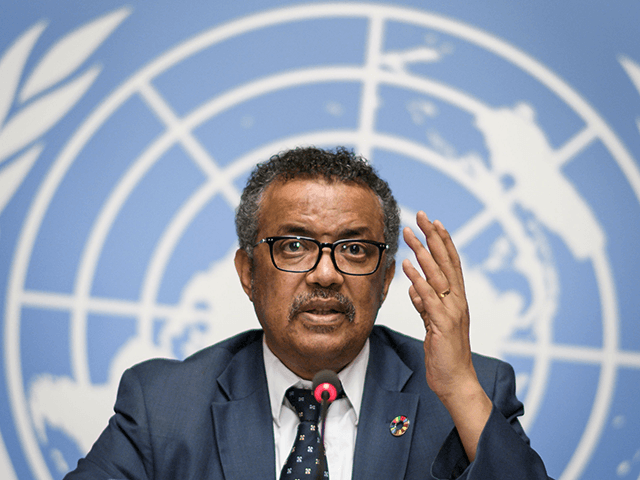The World Health Organization (W.H.O.) has published a special report in anticipation of the COP26 Climate Change Conference, insisting the “burning of fossil fuels is killing us.”
In its report titled “The Health Argument for Climate Action,” the W.H.O. calls climate change the “single biggest health threat facing humanity” and calls on governments to “act to tackle the climate crisis, restore biodiversity, and protect health.”
“While no one is safe from the health impacts of climate change, they are disproportionately felt by the most vulnerable and disadvantaged,” the report asserts.
To “avert catastrophic health impacts and prevent millions of climate change-related deaths,” the world must limit temperature rise to 1.5°C, the report states, referencing the Intergovernmental Panel on Climate Change (IPCC).
“The climate crisis is upon us, powered by our addiction to fossil fuels,” writes Dr Tedros Adhanom Ghebreyesus, W.H.O. Director-General in his foreword to the report. “The consequences for our health are real and often devastating.”
In an artful act of logical legerdemain, the report plays a shell game between climate change and air pollution.

Tedros Adhanom Ghebreyesus, Director General of the World Health Organization, (L) shakes hands with Chinese President Xi Jinping before a meeting at the Great Hall of the People, on January 28, 2020 in Beijing, China. (Naohiko Hatta – Pool/Getty Images)
The report bears an introductory dedication: “In memory of Ella Kissi-Debrah – and all other children who have suffered and died from air pollution and climate change.”
But 9-year-old Ella Kissi-Debrah did not die from air pollution and climate change, she died from air pollution and asthma. To gratuitously and falsely add “climate change” as a cause of death might strike some as disingenuous.
The W.H.O.’s special report does acknowledge that air pollution “causes 13 deaths per minute worldwide,” a stunning statistic in its own right.
What the W.H.O. fails to note is that the celebrated 2015 Paris Climate Accord never even mentions “air pollution” in its 27-page text, focusing exclusively on climate change.
In a major 2017 study, the UK-based Lancet medical journal reported that pollution-related diseases were responsible for an estimated 9 million premature deaths in 2015, or some 15 times more than from all wars and other forms of violence combined.
Pollution is not only the largest environmental cause of disease and premature death in the world today, the study found, but diseases caused by pollution were responsible for roughly 16 percent of all deaths worldwide — “three times more deaths than from AIDS, tuberculosis, and malaria combined and 15 times more than from all wars and other forms of violence.”
It is remarkable that given the magnitude of the negative impact of air pollution on human health, the United Nations is spending its efforts trying to convince first-world countries to curb the emission of carbon dioxide (a colorless, odorless, non-toxic gas) rather than focusing on cleaning the air in third-world countries where people are dying daily from the pollution.

W.H.O. Director-General Tedros Adhanom Ghebreyesus reacts during the opening of the World Health Organisation Academy in Lyon, central France, Monday, Sept. 27, 2021. (Denis Balibouse/Pool Photo via AP)
In an October 7 essay in the Wall Street Journal, climate expert Bjorn Lomborg declared that working to end global warming “could hurt the poor more than help” because of its negative impact on economic development.
Malnutrition deaths “have declined dramatically over the past three decades and will continue to drop rapidly over the next three,” Lomborg noted, a phenomenon overwhelmingly driven by economic growth.
“This puts the impact of global warming in context: For nutrition, climate change isn’t a disaster, but something that slightly slows down progress,” he added.
“Growth policies can avoid 1.7 million annual deaths,” Lomborg concluded. “That is far more than any climate measures could provide.”
It does not take a conspiracy theorist to wonder whether the U.N.’s exclusive interest in climate change — which has not been convincingly tied to a single death — and its relative disregard for the established killer air pollution is not tied to geopolitical and economic interests unrelated to human health.

COMMENTS
Please let us know if you're having issues with commenting.